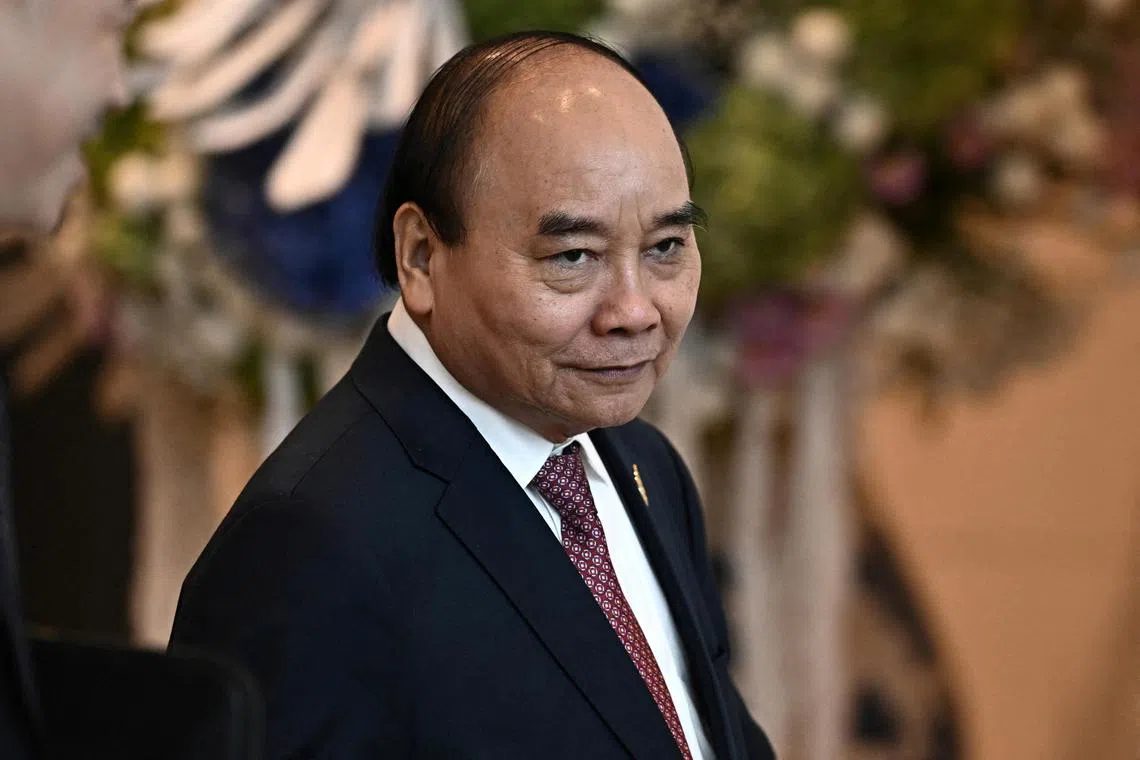Vietnam’s President Nguyen Xuan Phuc quits, blamed for ministers’ ‘violations’
Sign up now: Get insights on Asia's fast-moving developments

Mr Nguyen Xuan Phuc has been Vietnam's president for less than two years.
PHOTO: REUTERS
Follow topic:
BANGKOK - Vietnam President Nguyen Xuan Phuc has resigned amid a crackdown on corruption scandals
The Central Committee of Vietnam’s ruling Communist Party said on Tuesday that it agreed to let him relinquish his presidency as well as his seat in the Politburo. His departure must be approved by the National Assembly, which is expected to meet this week.
Mr Phuc, 68, was blamed for “violations and wrongdoing” by officials under his control while he was prime minister. He helmed the country’s battle against the pandemic during his term as premier from 2016 to 2021. But it was also under his leadership that graft scandals related to repatriation flights for Vietnamese as well as Covid-19 test kits emerged.
Although it is unclear if Mr Phuc – whose post as president was largely ceremonial – was directly linked to the scandals, media outlet VnExpress quoted the party’s Central Committee as saying: “As he was well aware of his responsibilities to the Party and the people, Phuc filed a request to resign from his positions and retire.”
This comes shortly after the ousting of two of Vietnam’s four deputy prime ministers, Pham Binh Minh and Vu Duc Dam, whose resignations were approved by the assembly on Jan 5. No reasons were given for their resignations.
Mr Minh was in charge of foreign policy, while Mr Dam was in charge of public health. Their positions as deputy prime ministers were swiftly handed over to Minister of Natural Resources and Environment Tran Hong Ha and the Party chief of Hai Phong city, Mr Tran Luu Quang.
The departures of Mr Minh and Mr Dam were widely linked to the extortionate fees Vietnamese found themselves having to pay in order to get on limited flights home during the pandemic, as well as inflated prices of Covid-19 test kits that were circulated with the help of some 800 billion dong (S$45 million) in kickbacks.
The crackdown on these two high-profile scandals has so far led to the prosecution of over 100 individuals, including former health minister Nguyen Thanh Long
Top-level resignations are a relatively new phenomenon in the years-long “blazing furnace” anti-corruption campaign spearheaded by party general secretary Nguyen Phu Trong. The 78-year-old veteran, who won an unprecedented third term in 2021,
Analysts have noted that even officials who have not been disciplined by the party or prosecuted for criminal wrongdoing are increasingly expected to resign to take responsibility for violations that occurred under their watch.
Emeritus Professor Carl Thayer from Australia’s University of New South Wales earlier told The Straits Times that the scope of accountability for wrongdoing now includes politicians who have vouched for or have supervised the errant officials.
In an article published on Tuesday, ISEAS – Yusof Ishak Institute senior fellow Le Hong Hiep wrote that there is little evidence the current reshuffles would lead to political instability or affect Vietnam’s economic performance.
“General Secretary Trong remains firmly in charge, and there is no indication that the personnel changes are causing disunity within the party or engendering instability in the political system,” he wrote. “As long as the leadership reshuffles do not lead to radical policy changes, their impact on the economy will also be limited.”
Vietnam, a major manufacturing hub, is projected by the Asian Development Bank to grow by 6.3 per cent in 2023,


